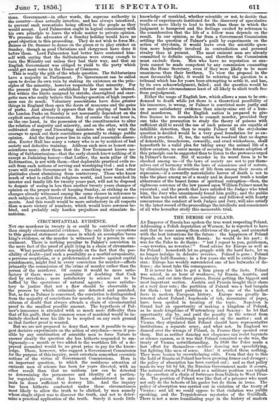CIRCUMSTANTIAL EVIDENCE.
NOT one murderer in twenty is or could be 'convicted on other than simply circumatantial evidence. The only likely exceptions' to this general statement are cases in which an accomplice turns king's evidence, or the murder is witnessed by a person in con- cealment. There is nothing peculiar to Palmer's conviction in the mere fact of the proof of guilt lying in a chain of circumstan- ces. What peculiarity exists depends on the fact that the p'pos- sibility of doubt-just such a possibility as a morbid scrupulosity, a perverse scepticism, or a predetermined resolve against capital punishments, might find in every conviction for murder—affects primarily the commission of the crime of murder rather than the person of the murderer. Of course it would be more satis- factory if there were no possibility of doubting that Cook died by strychnia ; more satisfactoryto science not to be baffled by the operations of natural agents ; more satisfac- tory to justice that not a flaw should be observable in the process by which criminals are detected and punished. But, as far as Palmer is concerned, the conviction is distinguished from the majority of convictions for murder, in reducing the re- siduum of doubt that always attends a chain of circumstantial proof to the smallest possible amount. The hypothesis of Pal- mer's innocence is attended with so much more difficulty than that of his guilt, that the common sense of mankind would be in- finitely shocked were his life to be respited on any such ground as that further proof is wanted. - But we are not prepared to deny that, were it possible to sug- gest decisive experiments on the action of strychnia—vere it pos- sible by any combination of scientific men to force Nature to answer clearly the question she has hitherto responded to am- bignously—a month or two- added to the worthless life of a de- praved scoundrel would be no great price to pay for the know- ledge. Those, however, who suggest a Government Commission for the purpose of this inquiry, must entertain somewhat eccentric notions of the virtue of Government Commissions. Here is an important question, to which the assiduous attention of eminent men of science has been for years directed, with no other result than that no uniform law can be detected As determining the permanence and identity of a particu- lar vegetable poison that has been administered to ani- -mals in doses sufficient to destroy life. And the inquiry has 'been hitherto conducted under those circumstances most likely to allow the truth to be elicited, by men namely whose single object was to discover the truth, and not to deter- mine a practical application of the truth. Surely it needs little
•
knowledge of mankind, whether scientific or not, to decide that results of experiments instituted for the disoovery of speculative truth are more likely to lead to truth than those in which the judgment is hampered and the feelings excited by reference to the consideration that the life of a fellow man depends on the' result. In our opinion, so far from a Government Commission settling the question of Palmer's guilt by experiments on the action of etrychnia, it would leave even the scientific ques- tion more hopelessly involved in contradiction and personal rivalry than at present. The most eminent men are already committed to definite opinions, and therefore the Commission must exclude them. 'Men who have no -reputation as ana- lysts cannot be made competent by any commission emanating from the Home Secretary, even if they were likely to be more unanimous than their brethren. To view the proposal in the most favourable light, it would be referring the question to a tribunal which has for years been attempting to settle it, and has, by its own acknowledgment, failed ; and the question would be. referred under circumstances least of all likely to elicit truth free from prejudgment.
Either the usage of English law, which allows a man to be con- demned to death while yet there is a theoretical possibility of his innocence, is wrong, or Palmer is convicted more justly and on more satisfactory evidence than ninety-'nine out of a hun- dred murderers. If the English nation is prepared to give free licence to its scoundrels to commit murder, provided they can take the precaution to study the theory of poisons with sufficient skill to avoid the use of such poisons as are capable of infallible detection, then to respite Palmer till the strychnine question is decided would be a very good foundation for so ex- cellent a practice. If, too, the nation be resolved that no degree of detestable, treacherous, cowardly, and cruel wickedness, shall henceforth be a valid plea for taking away the animal life of a fellow creature, no surer means of securing the future adoption of this principle can be suggested than to listen to the pretences urged Palmer'sin favour. But if murder in its worst form is to he checked among us—if the laws of society are not to put them- selves out of harmony with the laws of conscience and of nature, by eliminating the destruction of life from among their means of repression—if a cowardly materialistic horror of death is not to take the place among us of a manly and, in deepest truth a tender abhorrence of the hasest forms of spiritual corruption—then, the righteous sentence of the law passed upon William Palmer must be executed ; and the proofs that have satisfied the Judges who tried him, the Jury who unanimously found him guilty, and the public which has watched with close scrutiny and followed with hearty concurrence the conduct of both Judges and Jury, will also satisfy to the latest record of the proceedings the intellects and consciences of all who hereafter study this memorable trial.


































 Previous page
Previous page